By Susan D. Phillips and Kim Nguyen. Nguyen is a Postdoctoral Fellow with the Charity Insights Canada Project (CICP) or Projet Canada Perspectives des Organismes de Bienfaisance (PCPOB). Phillips is a Professor in the Philanthropy and Nonprofit Leadership program at the School of Public Policy and Administration, and is Policy Lead with CICP-PCPOB.
Restrictions on advocacy?
 The restrictions on ‘advocacy’ by Canadian charities were greatly relaxed in 2018 when the federal government amended the Income Tax Act to do away with a quantitative test of how much of a charity’s resources could be devoted to ‘political activities.’ Under the guidance that followed from the Charities Directorate of the Canada Revenue Agency (CRA), charities can engage in unlimited nonpartisan Public Policy Dialogue and Development Activities (PPDDAs) provided these activities further their charitable purposes.
The restrictions on ‘advocacy’ by Canadian charities were greatly relaxed in 2018 when the federal government amended the Income Tax Act to do away with a quantitative test of how much of a charity’s resources could be devoted to ‘political activities.’ Under the guidance that followed from the Charities Directorate of the Canada Revenue Agency (CRA), charities can engage in unlimited nonpartisan Public Policy Dialogue and Development Activities (PPDDAs) provided these activities further their charitable purposes.
Are Canadian charities taking a more active role in policy development and advocacy following this sweeping regulatory change? To explore this, the Charity Insights Canada Project (CICP) conducted a series of surveys in 2023-2024 assessing the state of advocacy across the sector and how it is adapting to the new PPDDA regime.
Five years later, there is little change
Most Canadian charities do not engage in advocacy and there has been little change in the five years since the regulations were relaxed; 43% of charities report no change in their advocacy activities, and 37% note that advocacy is not relevant to their missions in the first place. Only 1% have greatly increased advocacy, while 5% have had some increase and 1% a slight decrease under the new guidance.
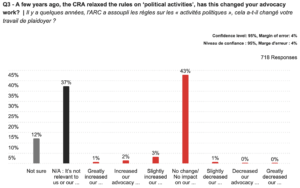
Survey CICP 1.2.9, February 2023
Less than half (42%) of the charities in the CICP February 2023 survey (CICP 1.2.9; N = 695) indicated they engage in advocacy ‘to change laws, rules or programs,’ while 50% said they do not, and 8% were not sure. When we asked the same question 18 months later in July 2024 (CICP 2.7.27), there had been a slight uptick in overall advocacy engagement, with 50% of charities (N = 795) involved in advocacy efforts, up by 8%.
Charities’ advocacy engagement in 2023 and 2024 |
|
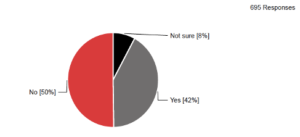 |
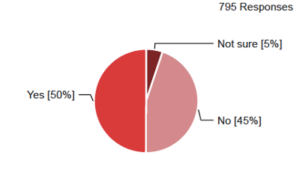 |
| Survey CICP 1.2.9, February 2023 | Survey CICP 2.7.27, July 2024 |
The overwhelming reason that charities are not active in policy dialogue and advocacy is that they do not see advocacy as relevant to their mission (45%).[1] The other main reasons for avoiding policy engagement fall into three categories (CICP 1.2.9, February 2023):[2]
- Other organizations advocate on their behalf (36%);
- Lack of time (29%), expertise (26%) or financial resources (23%); and
- Fear of losing support from governments (13%), other funders (10%) or the public (8%).
The February 2024 survey reinforced resource limitations (cited by 51%), but it also surfaced two additional challenges: difficulty engaging with policymakers (33%) and difficulty identifying other organizations’ concerns and connecting with larger advocacy networks (20%).
“We used to be more involved in advocacy, but working hard without seeing any policy changes has made us refocus our energy.”
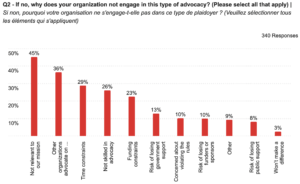
Survey CICP 1.2.9, February 2023
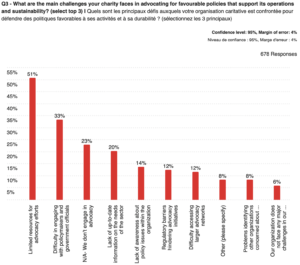
Survey CICP 2.2.4, February 2024
Interestingly, 10% – and a year later, 12% – raised concerns about violating CRA rules that could lead to a loss of charitable status. This is a misperception of the current regulation that has not dissipated over time. It suggests that many charities do not pay attention to their regulatory environment and that CRA needs to extend education and awareness of the PPDDA guidance.
“We must avoid advocacy as a charity but can educate or provide information. We have a hard time because we know we need to be careful not to cross into lobbying.”
“We need government to understand the challenges of our sector, but there’s a fear of advocating or lobbying because we don’t want to endanger our charitable status. It feels like we’re between a rock and a hard place.”
The How of policy participation: A limited toolbox
How charities engage in policy dialogue governments may range from more passive to more activist and mutual approaches:
- Passive: responding to requests for information and informal interactions with public officials (e.g., meeting elected officials in their ridings);
- Preparatory: sharing research; using social media and other communications to raise awareness and/or change perceptions of issues; encouraging others to action;
- Lobbying: meeting with elected officials and public servants; presenting briefs to Parliamentary committees; and advocating for or against a program or legislation;
- Co-production: working in an ongoing, interactive manner with government officials by serving on planning or advisory councils to co-create policy or co-produce implementation.
While 48% of Canadian charities indicate they formally meet (sometimes, often or always) with government officials, many of these discussions focus on obtaining grants or contracts. In effect, they serve an organizational self-interest rather than provide input into public policy more generally.
In general, charities tend to take passive approaches to policy such as responding to government requests for information and interacting socially with government officials. Only 22% indicate they sometimes, and only 4% often advocate for or against a bill, and only 15% have presented to parliamentary committees. There is also limited encouragement of collective action: only 26% encourage their members to contact policymakers, and only 22% release research reports that might be used by others.
| Action | Never or Rarely
% |
Sometimes
% |
Often
% |
Always
% |
Total of Some Action % |
| Passive | |||||
| Responding to requests for information from government | 45 | 30 | 13 | 8 | 51 |
| Interacting socially with government officials | 53 | 32 | 11 | 2 | 45 |
| Preparation | |||||
| Releasing research reports to the media, public or policymakers | 72 | 17 | 4 | 1 | 22 |
| Encouraging members to write, call, fax or email policymakers | 70 | 20 | 4 | 2 | 26 |
| Lobbying | |||||
| Formally meeting with government officials about the work they are doing | 59 | 33 | 13 | 2 | 48 |
| Discussing obtaining grants or contracts with government officials | 42 | 31 | 19 | 5 | 55 |
| Making representations in writing or verbally to a parliamentary committee | 80 | 12 | 2 | 1 | 15 |
| Advocating on behalf of or against a proposed bill or other policy pronouncement/proposal | 76 | 18 | 3 | 1 | 22 |
| Co-Production | |||||
| Working in a planning or advisory group that includes government officials | 60 | 23 | 11 | 2 | 36 |
| Survey CICP 2.7.27, July 2024; N = 795 | |||||
In sum, policy participation by Canadian charities is bifurcated: about half engage in policy and half do not. For the half with some level of involvement, we need to question the seriousness of that involvement, given the limited array of participation tools used, particularly those aimed at influencing existing policies.
Charities value greater policy participation
Although policy participation may be limited, a strong majority of charities (76%) – including those not currently active (July 2024) – say it is important that their organizations increase their participation in PPDDAs: only 12% consider this to be not important, and 11% are unsure or have no opinion.
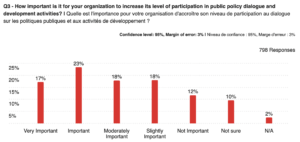
Survey CICP 2.7.27, July 2024
When asked how charities might advocate for policy changes, there is a strong preference for relationship-building and collective action through coalitions (April 2023; N = 623). A mismatch of recommended and actual approaches is evident, however, as only 15% of charities indicate they often meet with policymakers. There seems to be a line drawn between meeting with government officials and direct lobbying, as 69% recommend relationship-building but only 39% suggest direct lobbying. There is also a distinction between sharing data, recommended by 48%, and conducting policy research (recommended by 25%). This likely reflects a lack of research capacity in most charities, as only 5% report they often release research reports.
Time to come out of the cold
Despite arguments that charities have a moral obligation to participate in the development of public policy, the sector is widely criticized for having “lost its sense of urgency, too meekly becoming a pale vessel for service delivery.” This meekness is often attributed to the ‘advocacy chill’ created by the government of Stephen Harper. While a chill may have been deepened by the Harper government, we can’t simply look back a decade to explain the current reluctance to be policy advocates, a reluctance which the CICP surveys show exists.
Fostering meaningful participation in policy dialogue for Canadian charities goes beyond recent regulatory reform. Rather, the organizational, funding and sector environments in which charities operate implicitly shape strategic decisions to avoid policy participation.
Internal barriers – lack of time, expertise and resources – prevent charities from engaging in advocacy. But, they are also constrained by their perceptions of themselves: the sense that policy engagement and advocacy are not relevant to their missions. In addition, 1 in 10 charities do not know that current regulations are very permissive in the extent of advocacy allowed. For all the talk about trust-based philanthropy, funders, including governments, foundations and individual donors, spark fears that being activist will result in lost support. The lack of coordination and collaboration by the sector itself further inhibits policy engagement. The charitable sector could help itself by sharing information about charities’ policy concerns and facilitating stronger networks and coalitions.
Finally, governments make it difficult to engage. Effective policy dialogue and development should not be an adversarial process but one that has benefits for governments in developing and implementing more informed, cost-effective, and regional- and community-sensitive policies and programs. Charities are uniquely positioned to be reliable sources of such information if they could come out from the cold.
Want to receive blog posts from Charity Insights Canada Project directly to your email? Sign-up for our newsletter at the following link, and follow us on social-media for regular project updates:
Newsletter sign up: https://confirmsubscription.com/h/t/3D0A2E268835E2F4
Website: https://carleton.ca/cicp-pcpob/
LinkedIn: https://www.linkedin.com/company/cicp-pcpob/
Twitter: @CICP_PCPOB
Instagram: @CICP_PCPOB
Facebook: @CICP.PCPOB
—
[1] This finding mirrors a 2023 US study that found 56% of nonprofits not engaged in policy work reported that advocacy was not relevant to their missions. The July 2024 CICP survey replicated some of the questions of the US study, with similar findings.
[2] Participants could list more than one reason.
Thursday, October 24, 2024 in CICP (English), CICP-PCPOB, Data Discoveries, For homepage, News & Events, Public Policy & Advocacy
Share: Twitter, Facebook



